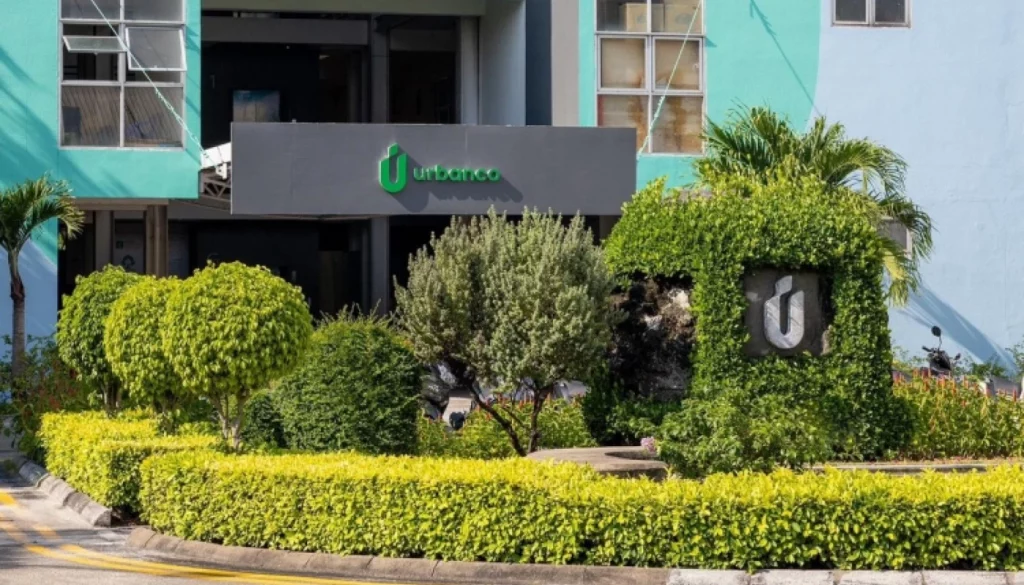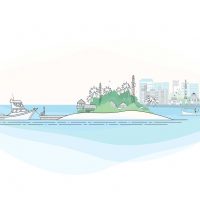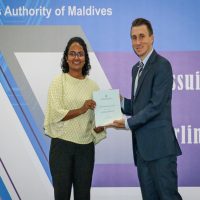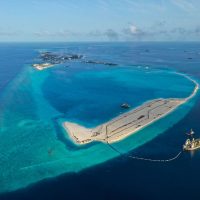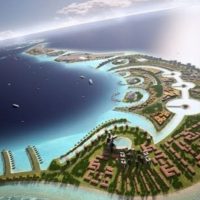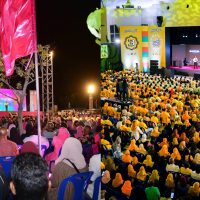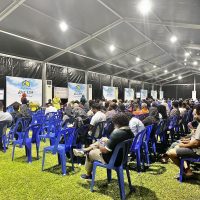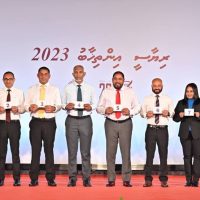The International Tribunal for the Law of the Sea delimited a new maritime boundary between the Maldives and the Chagos archipelago.
The Maldives and Mauritius – which claims sovereignty over the Chagos islands – disagreed on dividing overlapping exclusive economic zones, which extends 200 nautical miles from the coast according to the 1982 Convention on the Law of the Sea.
The court in Hamburg, Germany delineated a maritime border within the overlapping EEZs using the equidistance principle. A mid-point was calculated from the coasts of both states.
The technical dispute litigated at the tribunal concerned a low tide elevation called Blenheim Reef that Mauritius used as base points to calculate the equidistant line, which was slightly northward from the Maldives line. The parties agreed on dividing the territory aside from that 5% of the 92,000 square kilometre overlapping area.
The nine-judge Special Chamber decided that Blenheim Reef should not be used as base points but took account of the semi-submerged reefs as a relevant circumstance, making a small adjustment to draw the maritime boundary. The Maldives received 47,232 square kilometres and Mauritius 45,331 square kilometres (less than its original claim of 48,458 square kilometres). “The ratio of the areas allocated to the parties is 1:0.960 in favour of the Maldives,” the judgment noted.
The Maldives attorney general’s office welcomed the tribunal’s judgment on “the most significant issue in dispute, namely the alleged entitlement of Mauritius to a continental shelf beyond 200 nautical miles” with a claim of an additional overlapping area of 22,298 square kilometres. The chamber decided unanimously that it was “not in a position to determine the entitlement of Mauritius to the continental shelf” or to delimit the alleged overlapping area.
The Maldives also welcomed Mauritius’s intention to establish a Marine Protected Area surrounding the Chagos archipelago, which would address concerns over tuna stocks that could be threatened by industrial fishing. “This declaration is of great consequence given its importance to marine biodiversity, fisheries, and other interests of the Maldives,” the AG office said.
The tribunal’s judgment marked the first time that an international court resolved a maritime boundary dispute between two archipelagic states.
Briefing the local press, Professor Payam Akhavan, senior counsel of the Maldives legal team, called the judgment “a great victory for the Maldives.”
But Maldivians on social media lamented the purported loss of the country’s territory as opposition politicians alleged “treason.” A “secret” letter by the president that recognised Mauritius’s sovereignty over Chagos – a reversal of a decades-old stance – was blamed for the “loss of 44,000 square km” in the southern EEZ.
Speaker Mohamed Nasheed – who contends that the Maldives has a historical claim to Chagos – suggested that the Maldives should disregard the tribunal’s decision.
The opposition coalition staged a ‘Chagos’ rally in Malé with leaders vowing to impeach and imprison President Ibrahim Mohamed Solih, accusing his administration of selling Maldivian territorial waters. Acting leader Abdul Raheem Abdulla called on the public as well as the police and military to topple the government.
After a special cabinet meeting to discuss the judgment, President Solih held a press conference with most of the cabinet late on Friday night. Prior to the determination of the maritime boundary, the Maldives only exercised control of 12 nautical miles from the coast, the president said. “But with today’s decision we have got 200 miles. The disputed area with Mauritius has been divided,” he said. The fisheries minister noted that the coastguard would now be able to pursue illegal fishing vessels beyond 12 nautical miles.
Foreign Minister Abdulla Shahid stressed that no Maldivian government has ever claimed sovereignty over Chagos, whereas previous administrations negotiated with both the United Kingdom and Mauritius over delimiting a maritime boundary. The final opportunity to claim Chagos fell to former president Abdulla Yameen’s administration when the UN General Assembly sought an opinion from the International Court of Justice in 2017, Shahid said. But the previous government did not file an intervention and the ICJ ruled that the UK’s continued administration of Chagos violated international law.
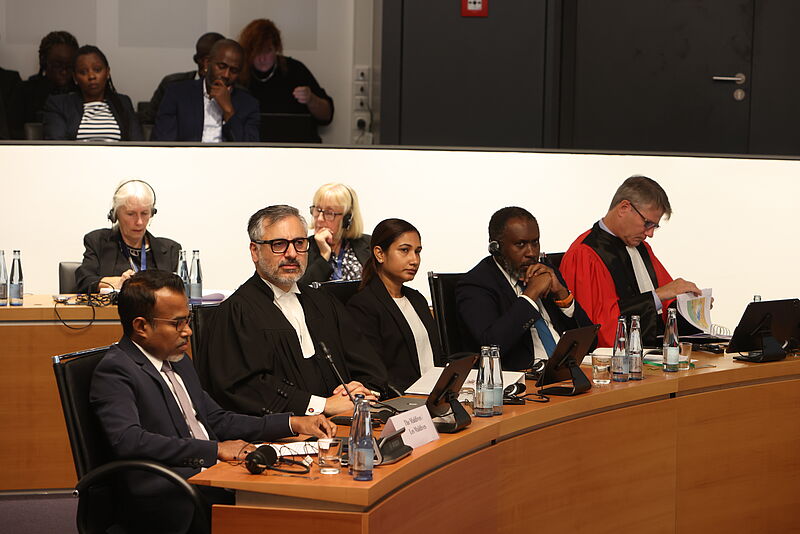
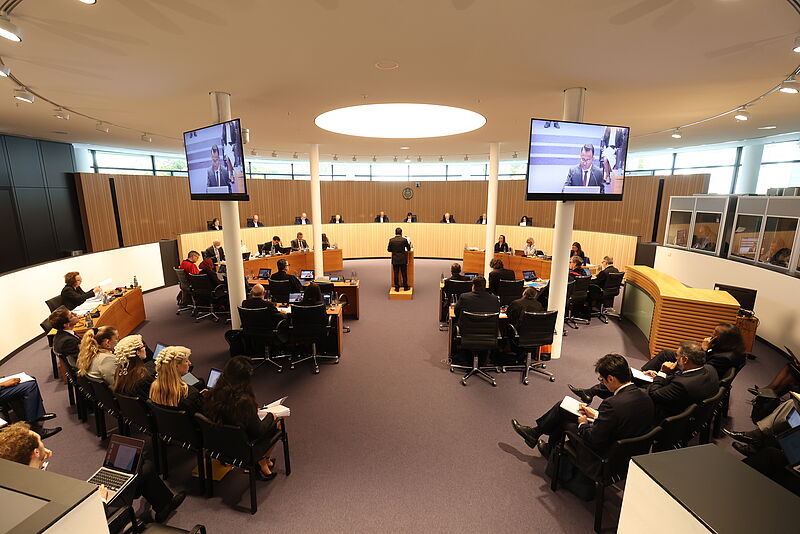
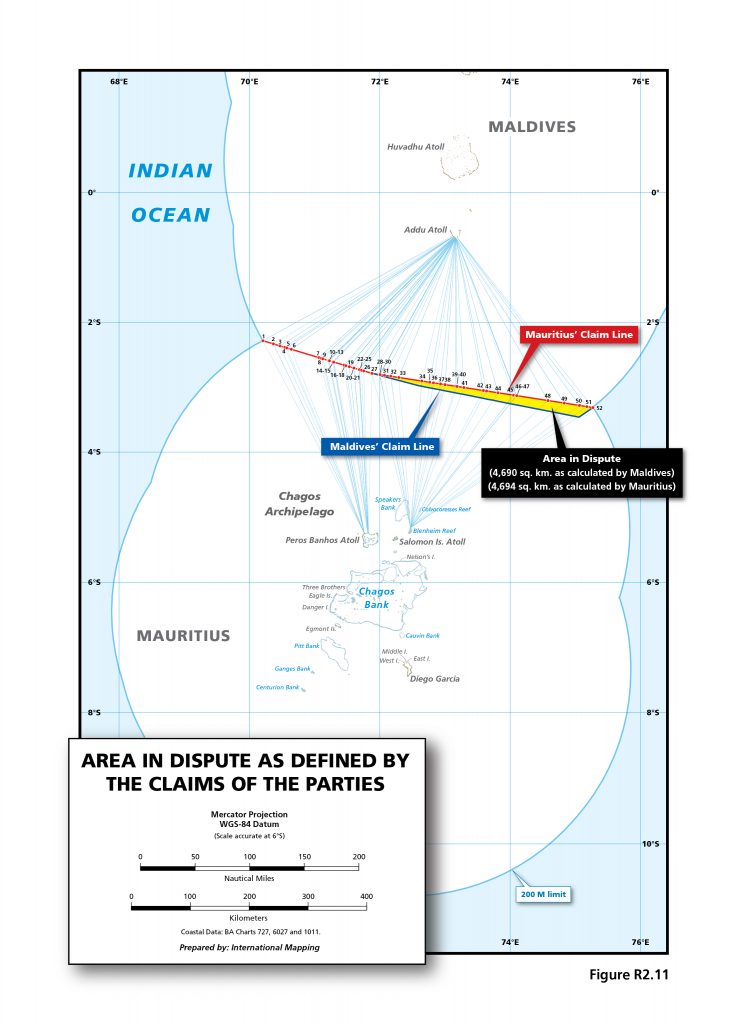
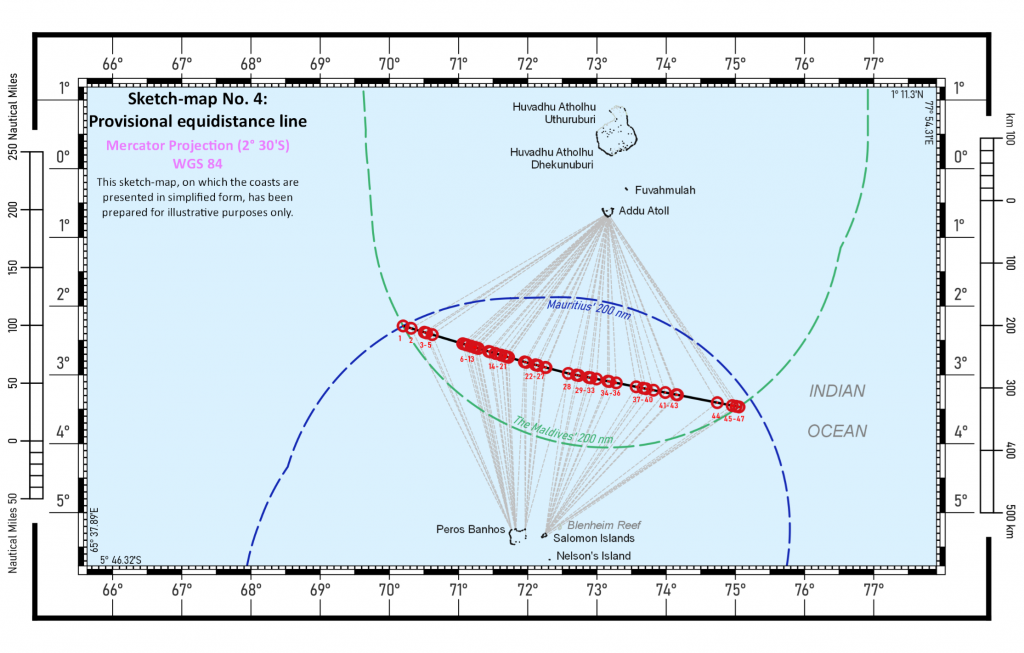
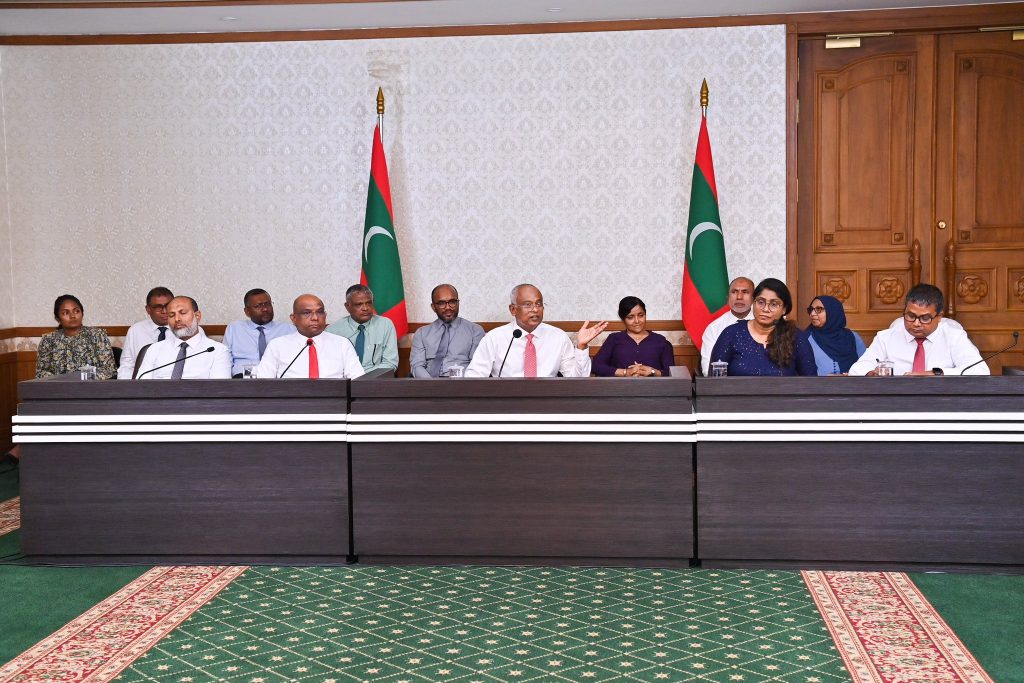
The government defended its decision to recognise Mauritius’s sovereignty over Chagos, a neighbouring archipelago south of Addu with an American naval base on the island of Diego Garcia.
The Maldives previously remained neutral in the sovereignty dispute between the United Kingdom and its former colony Mauritius. The UK separated its administration of Chagos from Mauritius in 1965 to form the British Indian Ocean Territory and forcibly removed an estimated 1,500 to 2,000 Chagossians, descendants of slaves and workers who were brought over after a French colony was established in the 18th century.
In February 2019, the International Court of Justice ruled that continuing British occupation was illegal. The UN General Assembly endorsed the advisory opinion with 116 countries calling on Britain to cede Chagos to Mauritius within six months. But the Maldives voted against the non-binding resolution on the grounds that it could undermine a 2010 bid to establish the outer limits of the continental shelf between the Maldives and Chagos, which extends beyond the country’s exclusive economic zone (EEZ) of 200 nautical miles from the coast. The claim drew a formal protest from Mauritius in 2011 over an encroachment on the Chagos zone.
Bolstered by the ICJ opinion in 2019, Mauritius asked the International Tribunal for the Law of the Sea (ITLOS) to delimit the maritime boundary in the overlapping EEZs. During oral arguments in October 2022, it emerged that the Maldives has decided to vote in favour of the next General Assembly resolution on the return of Chagos to Mauritius. President Ibrahim Mohamed Solih relayed the decision to the Mauritius prime minister in August 2022, Attorney General Ibrahim Riffath revealed, kicking off a political firestorm.
Following the reversal of the long-held stance, President Solih was accused of “treason” with the letter to his Mauritius counterpart, which was blamed for the potential loss of a part of the Maldives EEZ.
On Thursday, the opposition Progressive Party of Maldives asked the tribunal to delay its ruling, disputing the president’s constitutional authority “to make any communications with a bearing on the territory of the Maldives.” Allegations of bribery were made in parliament during an emergency debate on the issue on Monday. The Jumhooree Party and Maldives National Party also wrote letters to the tribunal.
But the government reiterated that “support to Mauritius’ claim on sovereignty over Chagos does not in any way prejudice or change Maldives’ ongoing claims at ITLOS.” While the constitution requires parliamentary approval for territorial changes, the tribunal case concerned the southern EEZ, “whose boundaries have never been, up until the present moment, determined by the Law of Sea Convention.” The Maldives has never claimed sovereignty over Chagos either, the government stressed, condemning the PPM’s letter as “an attempt to mislead the public and a petty attempt at scoring cheap political points on a matter of great public sensitivity.”
As the boundary dispute consumed public attention last year, lawmakers, former attorneys general and coalition party leaders decried recognition of Mauritius’s sovereignty as tantamount to forfeiting Maldivian territory. Former attorney general Dr Mohamed Munavvar disputed any entitlement for a Chagos economic zone due to the absence of an aboriginal population that benefitted from the archipelagic seas, whereas Maldivians have fished in the southern waters for centuries.
But University of Toronto Professor Payam Akhavan – senior counsel of the Maldives legal team – explained to the press in November that the Law of the Sea allows EEZs to be claimed for any habitable island.
The question of whether the neighbouring state is the UK or Mauritius was settled for the Maldives when the tribunal rejected objections that challenged its jurisdiction over the unresolved sovereignty dispute, Professor Akhavan explained.
The president’s decision to vote in favour of the ICJ opinion at the General Assembly was “the natural consequence” of the tribunal’s binding judgment that Mauritius should be considered the rightful owner of Chagos “for the purposes of drawing a maritime boundary.” Akhavan observed that the president was “simply giving effect to the position which exists now”. Despite negotiations with both the UK and Mauritius, the lack of clarity in the past precluded a boundary agreement such as the ones signed with India and Sri Lanka in the 1970s.
According to Speaker Mohamed Nasheed, the Chagos atoll of Foalhavahi was recorded in most Maldivian maps drawn after 1500. King Hassan IX laid claim to its five islands in a letter dated 1560. “Maldivian captains count the Maldives territory with Foalhavahi. There is much evidence of historical and cultural ties to say that it is an island of the Maldives,” the former president tweeted. Chagossians never lived on Foalhavalhi, known to Europeans as Peros Banhos, Nasheed stressed. “Even if Diego Garcia and some other atolls come under Mauritius sovereign power at a time when the British state leaves islands in the Chagos ridge, Maldivians are most deserving of sovereign power over Foalhavahi,” he argued.
But a Maldives claim to Chagos would be “a non-starter” because of the ICJ judgment, Professor Akhavan told reporters. Sovereignty for Mauritius despite the much larger distance to Chagos than the Maldives was a legacy of arbitrarily drawn colonial boundaries, he added.
In November, the UK – which has so far refused to respect the ICJ decision –decided to start negotiations with Mauritius to hand over Chagos. In February, Human Rights Watch called for full reparations to be paid to the Chagossians.
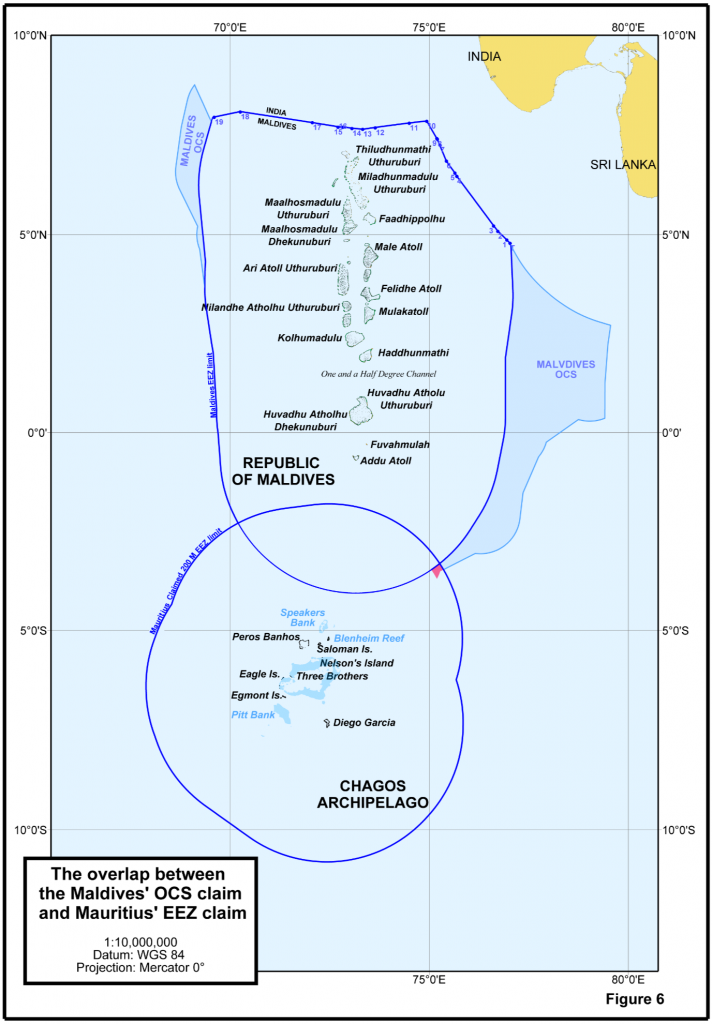
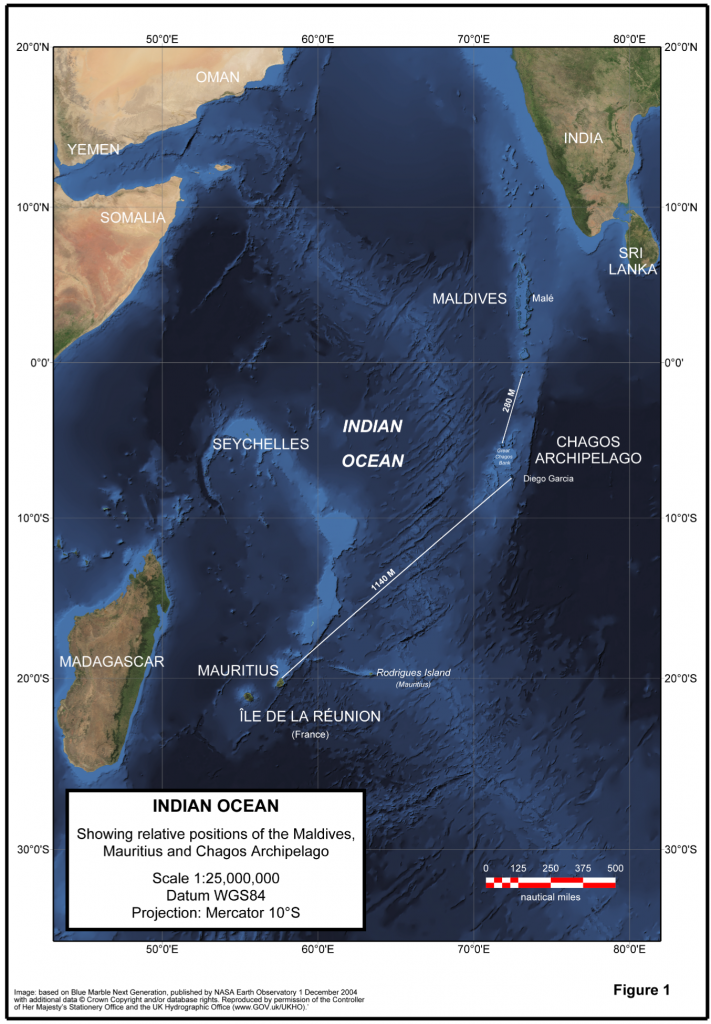
In less than 24 hours, the Malé City Council completed distributing 15,000 mature coconuts and 10 tons of watermelon donated by local resort company Champa Brothers.
Amid a shortage in mature coconuts during Ramadan, resort magnate Mohamed Moosa, known as Uchchu, also donated 35,000 coconuts to the public through the city council.
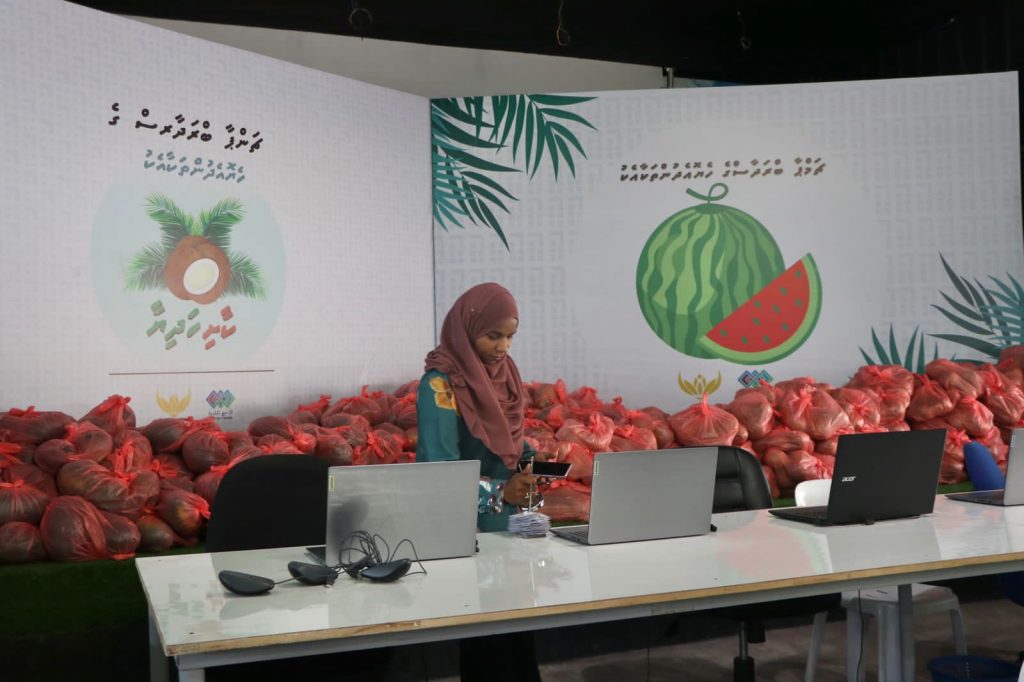
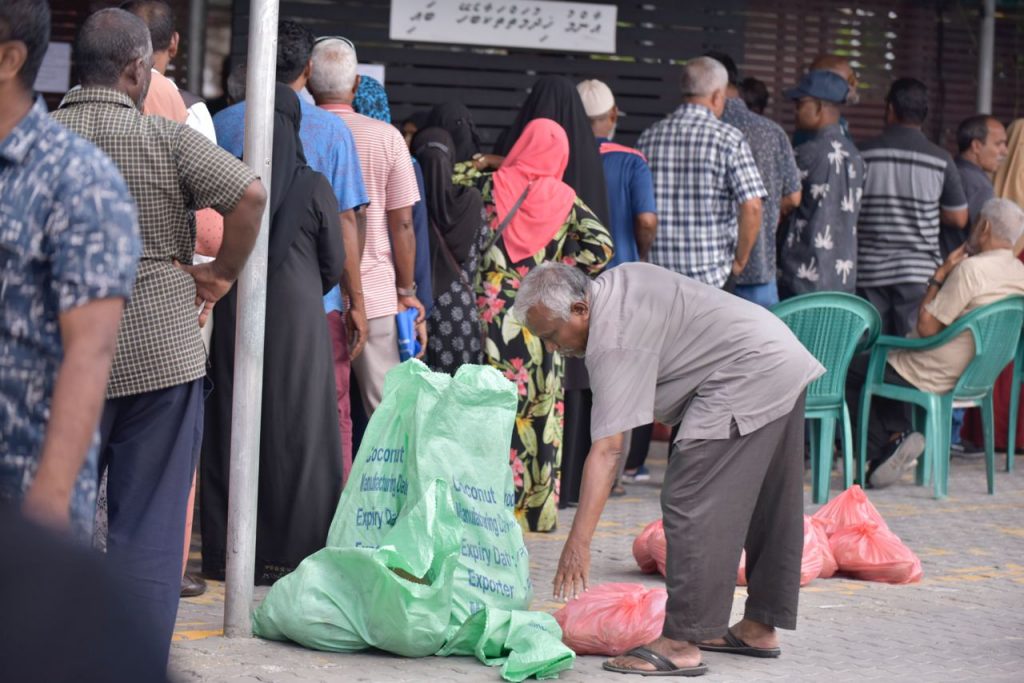
The criminal court postponed opening statements in former president Abdulla Yameen’s bribery and money laundering trial over the lease of Raa Fuggiri island. Judge Ali Nadheem rescheduled the hearing for next week after the opposition leader and his legal team complained of being unable to properly prepare because the prison authority failed to arrange enough meetings. The Judge ordered the state to ensure that Yameen is able to adequately meet lawyers.
Yameen also asked the judge to reconsider his decision not to arrange live broadcasts of upcoming witness testimony.
In late December, Yameen was convicted in a separate trial involving the no-bid lease of Vaavu Aarah. He was sentenced to 11 years in prison. The High Court is due to hear an appeal of the guilty verdict.
Both cases stemmed from a corruption scandal in which US$90 million was stolen during his administration. In the Fuggiri case, Yameen is accused of accepting a US$1.1 million bribe to lease the island for resort development. The Sun Construction and Sun Investment companies of resort magnate Ahmed Siyam as well as businessman Ahmed Riza were charged as co-defendants.
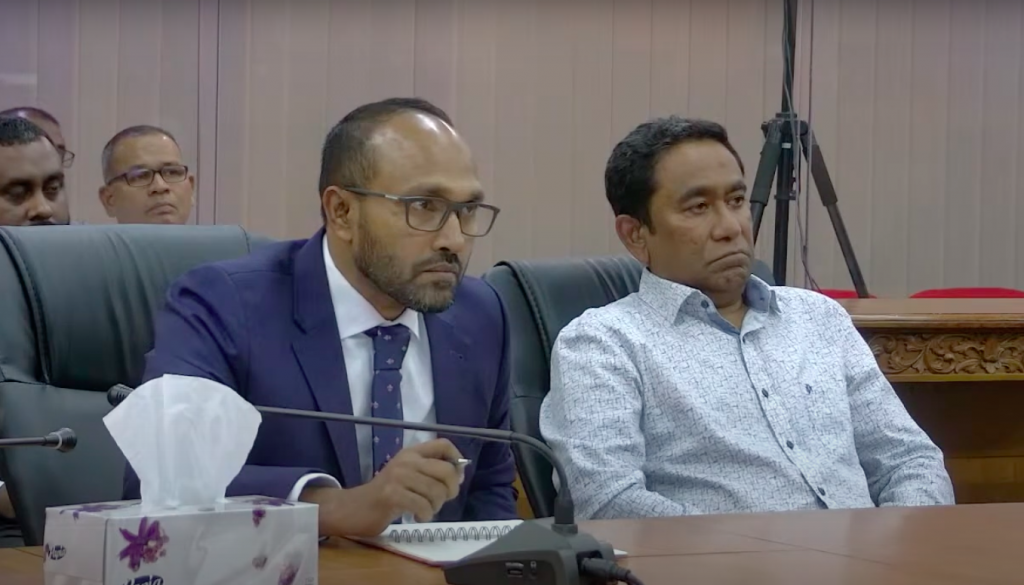
Ruling party lawmakers rejected amendments proposed to the evidence law to address concerns of journalists over provisions that allow courts to compel disclosure of sources.
The constitution guarantees the right to protect sources of information but the new law introduced exceptions in cases involving acts of terrorism or offences related to national security. A court could order disclosure if it decides
that there would be no negative impact either to the source or to the ability of journalists to find sources. Journalists who refuse to reveal the identity of a source could be found in contempt and
jailed for up to three months.
The amendments proposed by parliament’s judiciary committee sought to more clearly specify terrorism and national security-related offences and to determine factors that must be considered by a judge. The power to order disclosure was to be limited to the High Court.
But the changes were voted down and sent back to committee for further review.
The Maldives Media Council questioned the government’s commitment to press freedom and warned of obstacles to investigative journalism. The Maldives Journalists Association expressed concern over potential misuse in the absence if a law defining national security offences.
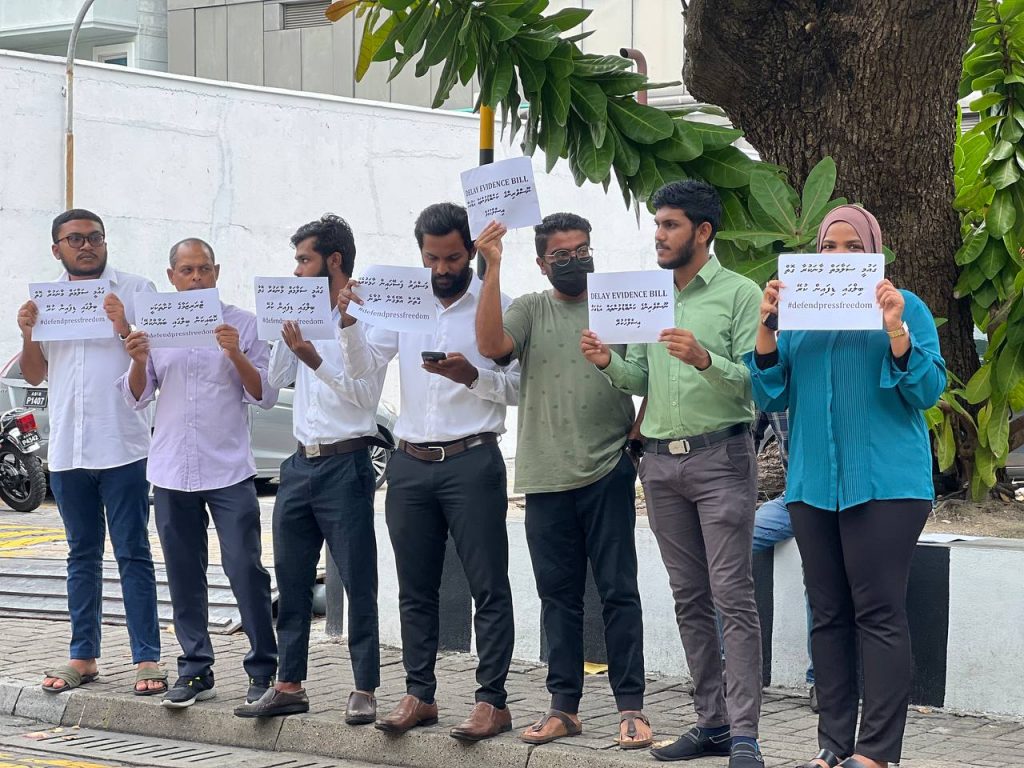
The Employment Tribunal revised its ethical guidelines to extend paid maternity leave for female members from two to six months.
The seven-member body came under fire in February after a viral Instagram post by tribunal member Sham’aa Ibrahim about bringing her son to work was widely covered by the press, prompting outrage on social media and condemnation from women’s rights groups. A request for an extension of maternity leave had been denied, according to Sham’aa. But the tribunal disputed her claims at the time, accusing her of bringing the institution into disrepute.
While female staff at the commission were granted six months of paid maternity leave, a two-month maternity leave for tribunal members had been approved as part of ethical guidelines passed unanimously in August 2021. As five of the seven members were women, the two-month period stipulated in the employment law had been decided upon in order to avoid disruptions to the tribunal’s work, the tribunal said in February.
The tribunal also defended its decision to advise Sham’aa not to bring her infant to work, citing the lack of an appropriate environment at the office. Her request to work from home could not be accommodated either as joining hearings remotely through audio or video conference was only allowed by the law in specified circumstances, the tribunal said at the time.
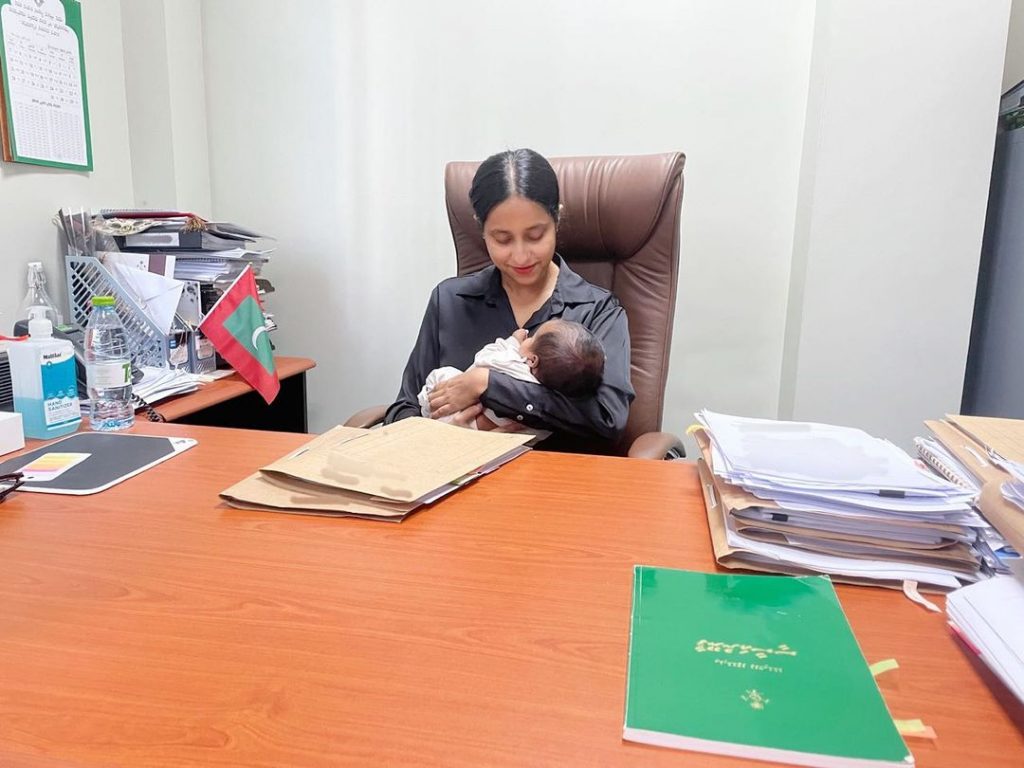
Despite a campaign pledge to make the Environment Protection Agency an independent body, complete autonomy from the executive “would not be the best system for a developing country like the Maldives”, Environment Minister Aminath Shauna told parliament, in response to a question about the failure to fulfil the pledge. Environmental regulatory bodies are part of the executive in the United States, United Kingdom and Singapore, she noted.
The current administration restored the EPA’s powers to authorise projects on resort islands, Shauna said, assuring that the agency is free from political influence.
The environment minister’s answer drew an angry response from lawmakers, some of whom repeated the question and demanded a straight answer on whether or not the pledge would be fulfilled.
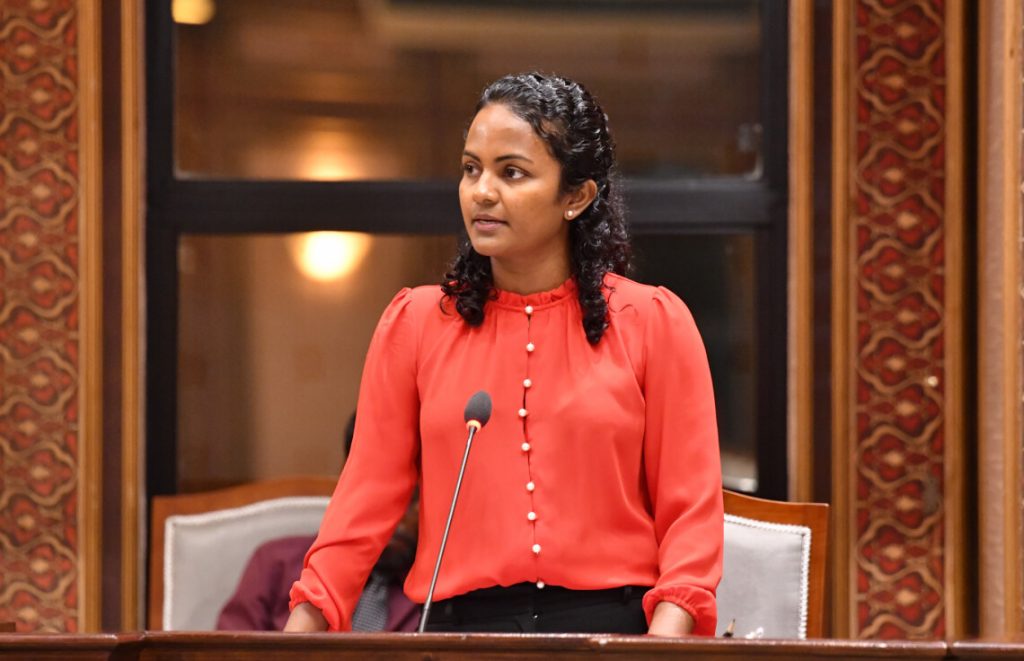
The Anti-Corruption Commission instructed various offices to recover MVR35 million (US$2.2 million) flagged in the investigation of graft cases concluded in 2022. But only MVR248,657 was recovered for the state last year. The bulk of the funds involved MVR31 million owed by the health ministry.
The High Court granted a stay order halting the enforcement of e-learning guidelines that prohibited conducting teaching courses online.
The order was issued pending a judgment on a case filed by former MP Ibrahim Ismail’s Malé High company, which operates the Mandhu College. The lawsuit challenged the legality of the guidelines formulated by the Maldives Qualifications Authority in August 2022. The High Court was petitioned to abolish the rules on the grounds that the MQA lacked the constitutional authority to enact such regulations.
The stay order allows the Mandhu College virtual campus to continue online courses. The MQA allowed distant learning after the Covid-19 lockdowns but later required face-to-face classes for some courses including teacher training.
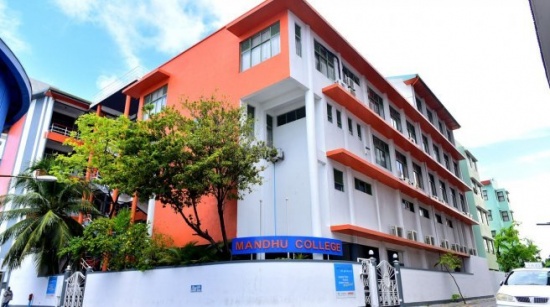
Of 206 cases reported to the gender ministry in March, 28 cases involved physical abuse against children and 13 cases involved sexual abuse of children. There were 13 cases of physical domestic violence.
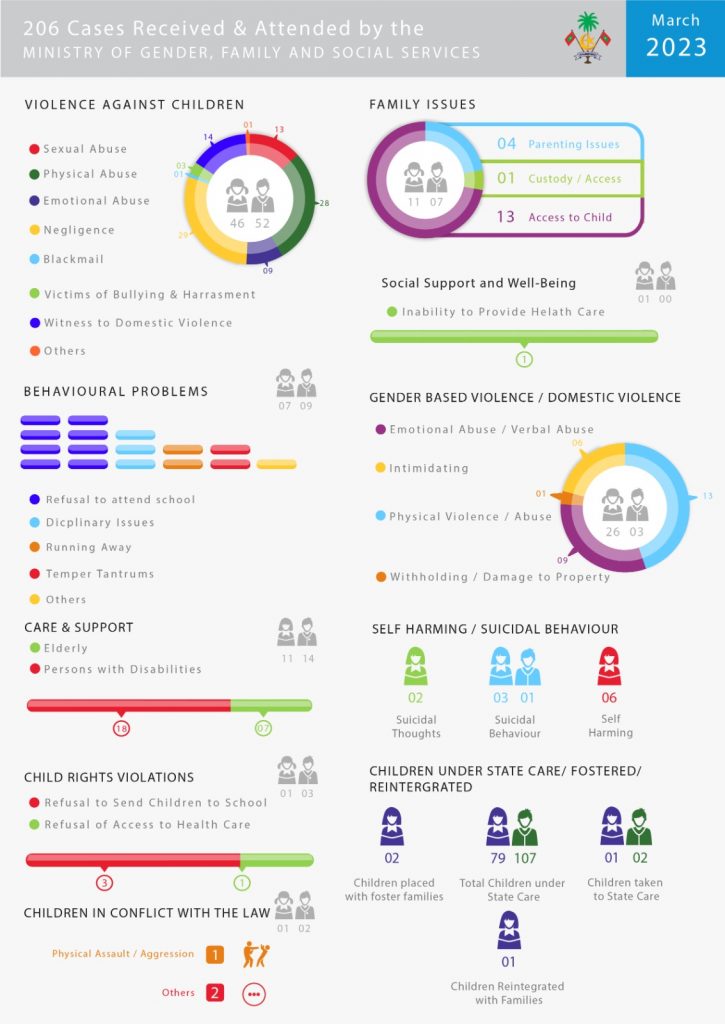
The Health Protection Agency reported two Covid-19 fatalities amid a surge in infections in the Greater Malé region.
The HPA did not reveal any information about the deaths.
Of 199 cases detected nationwide between 16 to 22 April, 137 cases were from the capital. There were 35 new hospital admissions during the period, up from 28 new hospital admissions the previous week.
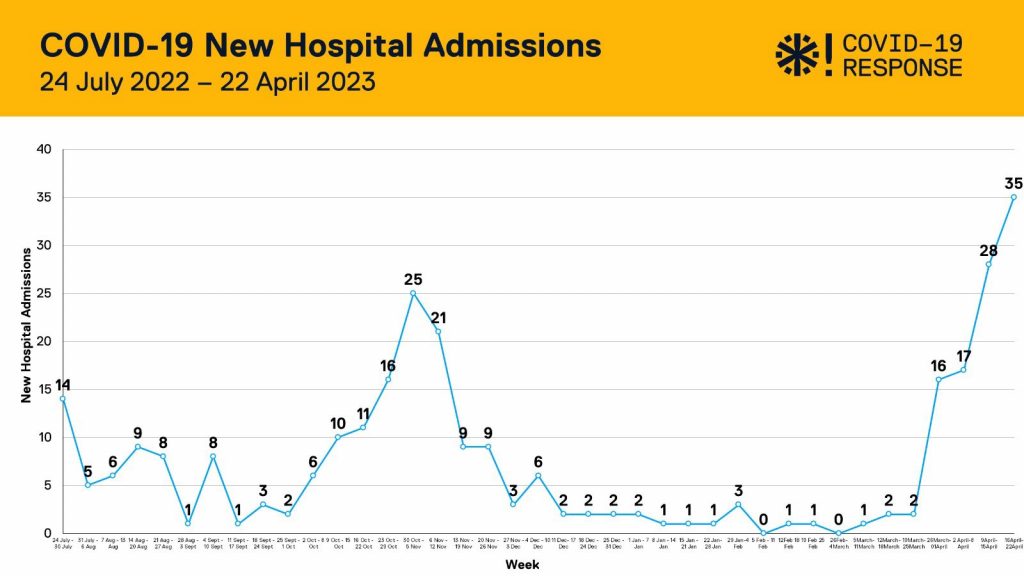
Several ruling party lawmakers opposed amendments proposed by the government to exempt bundles above 50 bags from the MVR2 (US$0.1) plastic bag fee that was introduced by the waste management law. All businesses registered for the goods and services tax are now required to charge the fee from customers at the point of sale for plastic bags sold or provided for free.
As the fee is charged at the rate of MVR2 per bag regardless of whether it is sold separately or together in bundles, the price of bundles spiked overnight – from MVR25 to MVR220 for a bundle of small bags – when the fee came into force on 18 April, sparking a public outcry as bundles are most commonly purchased to use for packing household trash. Businesses – who are required to include the fee collection in their GST returns and pay it to the tax authority – also complained of losses from having to buy plastic bag bundles at much higher prices.
The law exempted “bin liners” or garbage bags sold or supplied for free by waste management service providers. But the government’s Waste Management Corporation was unprepared last week and only started selling bin liners from its front offices in the Greater Malé region on Thursday (27 April). The tax-free bin liners are also available from the Luxury Shop in Malé. WAMCO later started taking online delivery orders with a minimum quantity of 24 packs.
The original draft of the waste management legislation included an exemption for plastic bag bundles above 50 bags. But the provision was removed before the bill was passed by parliament.
An amendment was proposed last month to restore the wholesale exemption. But during Monday’s preliminary debate on the bill, some pro-government lawmakers argued that the exemption would defeat the purpose of disincentivising businesses and combating plastic pollution. The environment ministry and the attorney general’s office did not object to omitting the exemption when the committee reviewed the waste management legislation, MP Ahmed Haitham noted.
Only MP Ibrahim Shareef spoke in favour of exempting bundles as proposed by the government. As parliament broke for a two-week recess on Thursday, Majority Leader Mohamed Aslam blamed Speaker Mohamed Nasheed for not expediting debate on the amendments to put it to a vote.
On Tuesday, officials from the Maldives Inland Revenue Authority told parliament’s environment committee that the input tax or set-off mechanism of the GST law could not be applied to avoid levying the plastic bag fee at every stage as businesses seek to recover costs.
The law currently only exempts plastic bags sold or provided free of charge by duty-free shops and “plastic bags used to carry unpackaged deep sea fish, reef fish, bait fish or fish used as bait, sea food and parts of such fish.” Plastic bags used by the manufacturer of goods for packaging are not subject to the fee either. But shops that sell unpacked rice, flour or sugar must charge the fee if it is provided in a plastic bag.
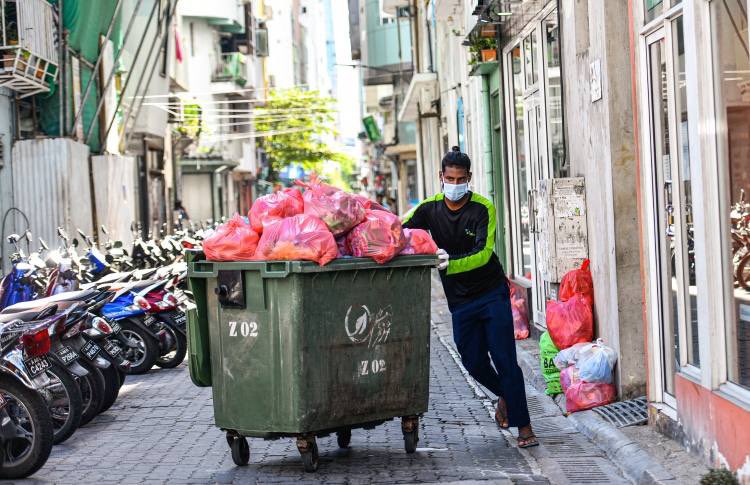
A 27-year-old man was arrested on suspicion of tearing pages from the Quran and smashing the glass door of a mosque on Vaavu Keyodhoo island.
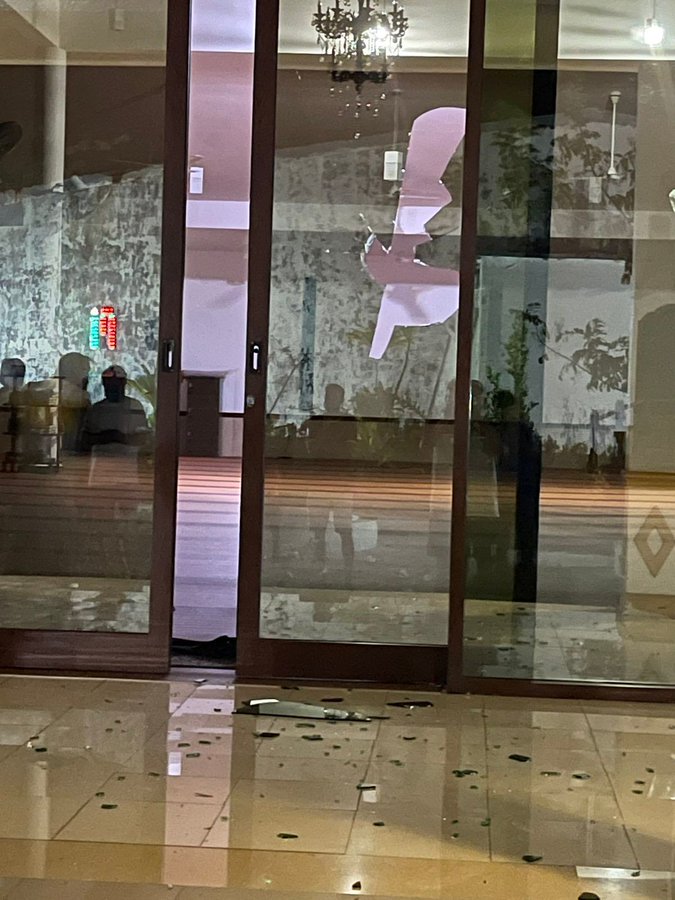
Two men, aged 63 and 25, were arrested from a southern island on suspicion of sexually abusing an 11-year-old girl. One of the suspects was related to the victim, the police informed the media.
In a separate case, a stepfather was arrested from a southern island earlier this month on charges of sexually assaulting his 13-year-old stepdaughter. The 33-year-old man was remanded for 30 days.
Amid a heatwave in Asia, the ‘feels like’ temperature hit 44 degrees celsius in some parts of the Maldives, a degree above the hottest ‘feels like’ temperatures – which takes humidity and wind into account – recorded last year.
The average power usage or energy consumption in the Greater Malé region reached a record level on Monday with a peak load above 102 megawatts at 2:10 p.m. The State Electricity Company advised steps to conserve energy, including keeping air-conditioners at 25 degrees.
The warmest period in the Maldives is between March to mid-May until the onset of the rainy southwest monsoon.
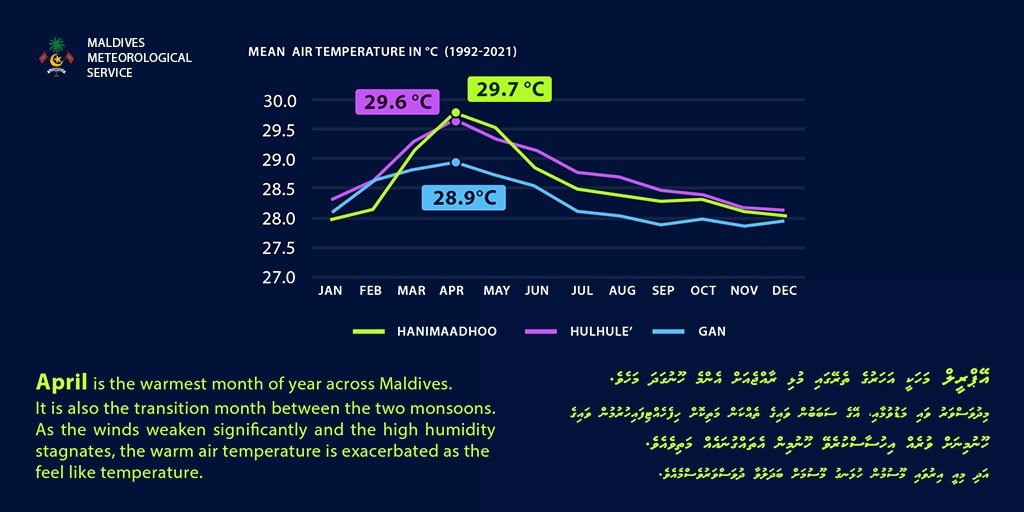
Criminal court judge Hassan Saeed retired from the bench. The Judicial Service Commission approved the retirement under new rules that allow judges to retire after turning 55 years of age.
In February, the judicial watchdog had suspended Saeed for two weeks with pay. When he was chief judge of the family court, Saeed was found to have violated ethical standards by advising the registrar to officiate an out-of-court marriage in contravention of regulations.
But an appeals committee overruled the suspension earlier this month. Saeed was therefore eligible for monthly state benefits and health insurance for children under 18 upon retirement.
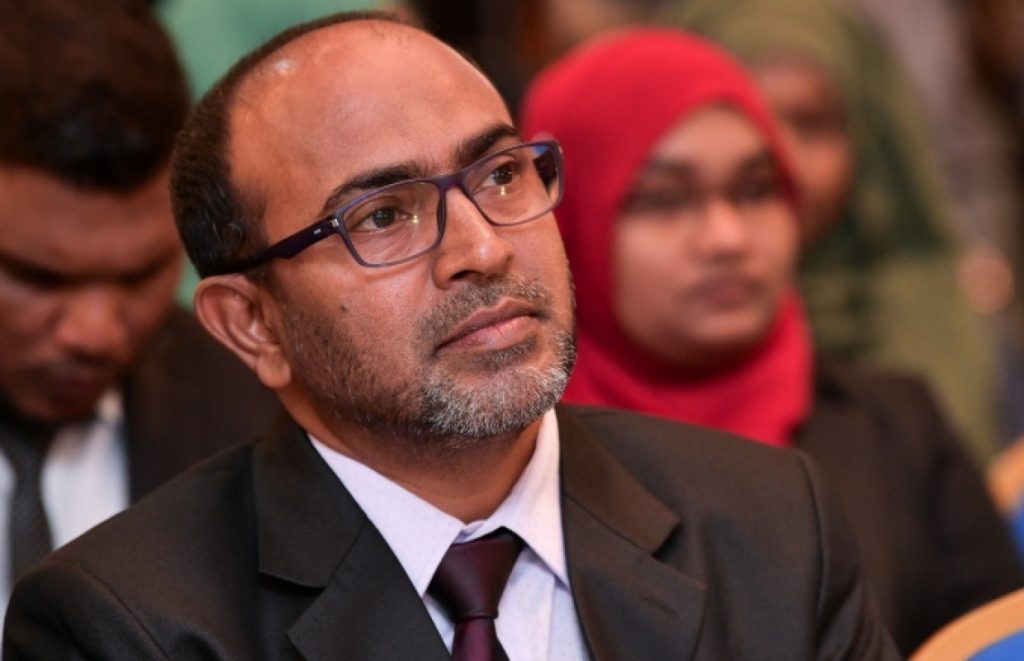
A list circulating on social media of 34 top Urbanco officials who were allegedly awarded flats is fake, the state-owned company insisted.
The Hulhumalé developer said it was planning to offer 34 flats from mixed residential housing projects to Urbanco staff. The flats came under Urbanco ownership under an agreement made with private contractors to allocate land for the apartment buildings. The 34 flats remained unsold during a staff housing scheme last year and Urbanco decided to offer the units for sale again as about 800 employees would be eligible, the company said.
But Urbanco did not specify the criteria for selling the flats or deny that senior officials or board members could apply.
Asked about the allegations during Wednesday’s sitting of parliament, Housing Minister Mohamed Aslam told lawmakers that Urbanco’s sale of flats must abide by social housing criteria – which requires recipients to not be a homeowner – and assured action after an inquiry.
